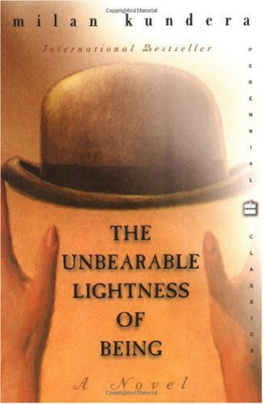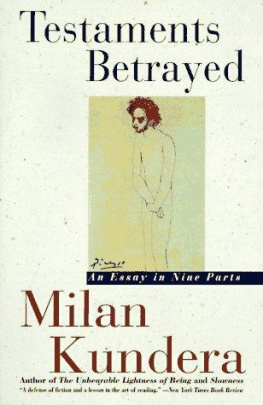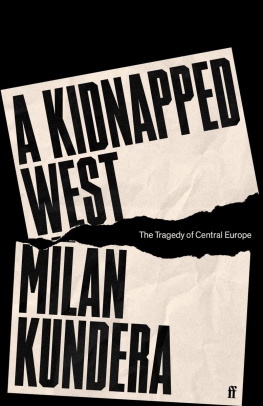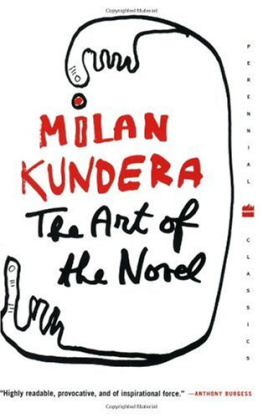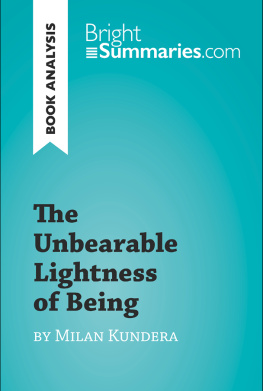: ( Fort / Da )
| Icq # 75088656
update 7/12/01
Also by Milan Kundera
THE JOKE LAUGHABLE LOVES LIFE IS ELSEWIIERE THE FAREWELL PARTY THE BOOK OF LAUGHTER AND FORGETTING JACQUES AND HISMASTER THE ART OF THE NOVEL IMMORTALITY
MILAN KUNDERA

The Unbearable Lightness of Being
Translated from the Czechby Michael Henry Heim
HarperPerennial
A Division of HwperCollins Publishers
Portions of this work originallyappeared, in somewhat different form. in The New Yorker.
Ahardcover edition of this book was published in 1984 by Harper & Row,Publishers, Inc.
the unbearable lightness of BEING. English translation copynght 1984 by Harper& Row, Publishers, Inc. Translated from Nesnesitelna lehkost byti,copyright 1984 by Milan Kundera. All rights reserved. Printed in the UnitedStates of America. No part of this book may be used or reproduced in any mannerwhatsoever without written permission except in the case of brief quotationsembodied in critical articles and reviews. For information addressHarperCollins Publishers, 10 East 53rd Street, New York, NY 10022.
First Harper Colophon edition published1985. Reissued in Perennial Library edition 1987. Reissued in HarperPerennialedition 1991.
Library of Congress Cataloging in Publication Data
Kundera, Milan.
The unbearable lightness of being.
"Perennial Library"
I. Heim,Michael Henry. II. Title. PG5039.21.U6U5 1987 891.8'635 83^8363ISBN 0-06-091465-3 (pbk.)
96 RRD H 40 39
CONTENTS
PART ONE Lightness and Weight 1
PART TWO Soul and Body 37
PART THREE Words Misunderstood 79
PART FOUR Soul and Body 729
PART FIVE Lightness and Weight 173
PART SIX The Grand March 241
PART SEVEN Karenin's Smile 279
PART ONE
Lightness and Weight
Theidea of eternal return is a mysterious one, and Nietzsche has often perplexedother philosophers with it: to think that everything recurs as we onceexperienced it, and that the recurrence itself recurs ad infinitum! What doesthis mad myth signify?
Putting itnegatively, the myth of eternal return states that a life which disappears onceand for all, which does not return, is like a shadow, without weight, dead inadvance, and whether it was horrible, beautiful, or sublime, its horror,sublimity, and beauty mean nothing. We need take no more note of it than of awar between two African kingdoms in the fourteenth century, a war that alterednothing in the destiny of the world, even if a hundred thousand blacks perishedin excruciating torment.
Will the warbetween two African kingdoms in the fourteenth century itself be altered if itrecurs again and again, in eternal return?
It will: it will become a solid mass,permanently protuberant, its inanity irreparable.
If the French Revolution were to recureternally, French historians would be less proud of Robespierre. But becausethey deal with something that will not return, the bloody years of theRevolution have turned into mere words, theories, and discussions, have becomelighter than feathers, frightening no one. There is an infinite differencebetween a Robespierre who occurs only once in history and a Robespierre whoeternally returns, chopping off French heads.
Let us therefore agree that the idea ofeternal return implies a perspective from which things appear other than as weknow them: they appear without the mitigating circumstance of their transitorynature. This mitigating circumstance prevents us from coming to a verdict. Forhow can we condemn something that is ephemeral, in transit? In the sunset ofdissolution, everything is illuminated by the aura of nostalgia, even theguillotine.
Not long ago, I caught myself experiencinga most incredible sensation. Leafing through a book on Hitler, I was touchedby some of his portraits: they reminded me of my childhood. I grew up duringthe war; several members of my family perished in Hitler's concentration camps;but what were their deaths compared with the memories of a lost period in mylife, a period that would never return?
This reconciliation with Hitler reveals theprofound moral perversity of a world that rests essentially on the nonexistenceof return, for in this world everything is pardoned in advance and thereforeeverything cynically permitted.
If every second of our lives recurs an infinite numberof times, we are nailed to eternity as Jesus Christ was nailed to the cross. Itis a terrifying prospect. In the world of eternal return the weight ofunbearable responsibility lies heavy on every move we make. That is whyNietzsche called the idea of eternal return the heaviest of burdens (dasschwerste Gewicht).
If eternal return is the heaviest of burdens, then ourlives can stand out against it in all their splendid lightness.
But is heaviness truly deplorable and lightnesssplendid?
The heaviest of burdens crushes us, we sink beneath it,it pins us to the ground. But in the love poetry of every age, the woman longsto be weighed down by the man's body. The heaviest of burdens is thereforesimultaneously an image of life's most intense fulfillment. The heavier theburden, the closer our lives come to the earth, the more real and truthful theybecome.
Conversely, the absolute absence of a burden causes manto be lighter than air, to soar into the heights, take leave of the earth andhis earthly being, and become only half real, his movements as free as they areinsignificant.
What then shall we choose? Weight or lightness?
Parmenides posed this very question in the sixthcentury before Christ. He saw the world divided into pairs of opposites:
light/darkness, fineness/coarseness, warmth/cold,being/non-being. One half of the opposition he called positive (light, fineness,warmth, being), the other negative. We might find this division into positiveand negative poles childishly simple except for one difficulty: which one ispositive, weight or lightness?
Parmenides responded: lightness is positive, weightnegative.
Was he correct or not? That is the question. The only certainty is: thelightness/weight opposition is the most mysterious, most ambiguous of all.
Ihave been thinking about Tomas for many years. But only in the light of thesereflections did I see him clearly. I saw him standing at the window of his flatand looking across the courtyard at the opposite walls, not knowing what todo.
He had first metTereza about three weeks earlier in a small Czech town. They had spent scarcelyan hour together. She had accompanied him to the station and waited with himuntil he boarded the train. Ten days later she paid him a visit. They made lovethe day she arrived. That night she came down with a fever and stayed a wholeweek in his flat with the flu.
He had come tofeel an inexplicable love for this all but complete stranger; she seemed achild to him, a child someone had put in a bulrush basket daubed with pitch andsent downstream for Tomas to fetch at the riverbank of his bed.
She stayed withhim a week, until she was well again, then went back to her town, some hundredand twenty-five miles from Prague. And then came the time I have just spoken ofand see as the key to his life: Standing by the window, he looked out over thecourtyard at the walls opposite him and deliberated.
Should he callher back to Prague for good? He feared the responsibility. If he invited her tocome, then come she would, and offer him up her life.

